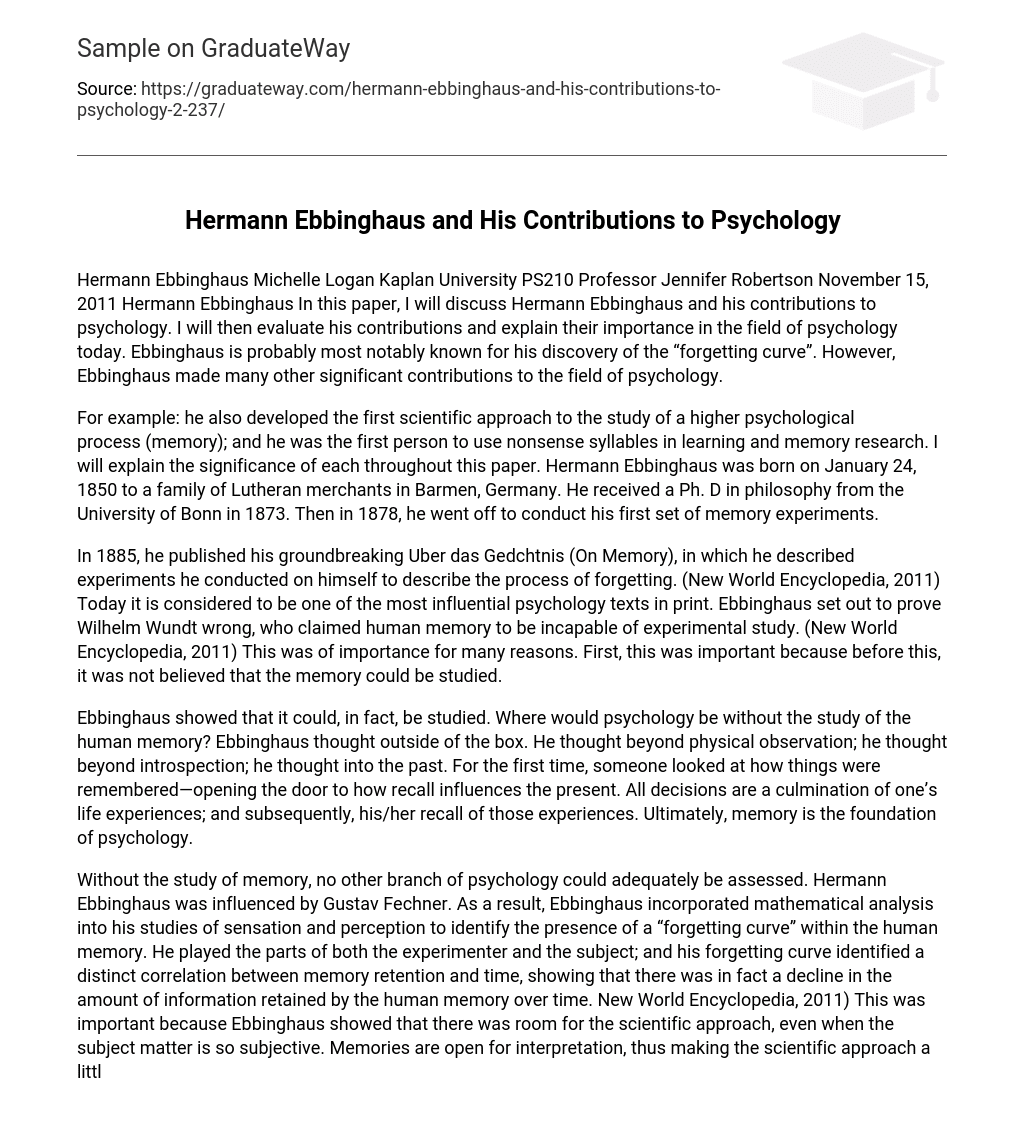Hermann Ebbinghaus Michelle Logan Kaplan University PS210 Professor Jennifer Robertson November 15, 2011 Hermann Ebbinghaus In this paper, I will discuss Hermann Ebbinghaus and his contributions to psychology. I will then evaluate his contributions and explain their importance in the field of psychology today. Ebbinghaus is probably most notably known for his discovery of the “forgetting curve”. However, Ebbinghaus made many other significant contributions to the field of psychology.
For example: he also developed the first scientific approach to the study of a higher psychological process (memory); and he was the first person to use nonsense syllables in learning and memory research. I will explain the significance of each throughout this paper. Hermann Ebbinghaus was born on January 24, 1850 to a family of Lutheran merchants in Barmen, Germany. He received a Ph. D in philosophy from the University of Bonn in 1873. Then in 1878, he went off to conduct his first set of memory experiments.
In 1885, he published his groundbreaking Uber das Gedchtnis (On Memory), in which he described experiments he conducted on himself to describe the process of forgetting. (New World Encyclopedia, 2011) Today it is considered to be one of the most influential psychology texts in print. Ebbinghaus set out to prove Wilhelm Wundt wrong, who claimed human memory to be incapable of experimental study. (New World Encyclopedia, 2011) This was of importance for many reasons. First, this was important because before this, it was not believed that the memory could be studied.
Ebbinghaus showed that it could, in fact, be studied. Where would psychology be without the study of the human memory? Ebbinghaus thought outside of the box. He thought beyond physical observation; he thought beyond introspection; he thought into the past. For the first time, someone looked at how things were remembered—opening the door to how recall influences the present. All decisions are a culmination of one’s life experiences; and subsequently, his/her recall of those experiences. Ultimately, memory is the foundation of psychology.
Without the study of memory, no other branch of psychology could adequately be assessed. Hermann Ebbinghaus was influenced by Gustav Fechner. As a result, Ebbinghaus incorporated mathematical analysis into his studies of sensation and perception to identify the presence of a “forgetting curve” within the human memory. He played the parts of both the experimenter and the subject; and his forgetting curve identified a distinct correlation between memory retention and time, showing that there was in fact a decline in the amount of information retained by the human memory over time. New World Encyclopedia, 2011) This was important because Ebbinghaus showed that there was room for the scientific approach, even when the subject matter is so subjective. Memories are open for interpretation, thus making the scientific approach a little tricky. Ebbinghaus used his forgetting curve to show what he forget in terms that other could relate to. They could actually see the amount of information lost over time and at what rate. With the entire field of psychology being so subjective, this was an important contribution.
He showed future generations that it was possible to collect subjective information and use it to make an objective hypothesis. Ebbinghaus also studied comparative learning rates regarding significant and insignificant sets of information. Ebbinghaus found that significant material was retained longer by the human memory than less insignificant material. He used the psychological study of association and learning through his experimental techniques, thus coining the term “nonsense syllable,” (New World Encyclopedia, 2011) He measured how easily recalled the non-sense syllables were in relation to relevant information or words.
He found that valid words or bits of information were recalled easier and more frequently than the useless sounds or bits of information. This was important for many reasons. To start, this showed that there was some consistency to memory. Therefore, there was some science to it. Also, this showed that there is some type of sorting process involved in which non-relevant information is weeded out. By knowing this, future psychologists are/were able to build on that idea. In addition, the “non-sense syllable” experiments demonstrated the value of the use of association.
Overall, I would say that Hermann Ebbinghaus made some rather significant contributions to the field of psychology. He opened the eyes of many of his colleagues and he opened the doors for future psychologists and other scientists. I believe that if Ebbinghaus were still around today that he would be studying Alzheimer’s and dementia. Perhaps some of his discoveries will lead to a cure for these debilitating diseases. Or perhaps his work will lead to the discovery of some memory improving techniques.
No one can say for sure exactly how great of an impact Ebbinghaus will have had on science as a whole, as his work will continue to influence future generations. But one thing is for sure, Ebbinghaus is truly a founding father and psychology would not be what it is today without him. References New World Encyclopedia. (2011). Ebbinghaus, Hermann. (n. d. ). Retrieved November 12, 2011, from http://www. newworldencyclopedia. org/entry/Hermann_Ebbinghaus Schultz P. Duane, Schultz Ellen Sydney. A History of Modern Psychology 10th ed. WadaWorth Cengage Learning. 2011





